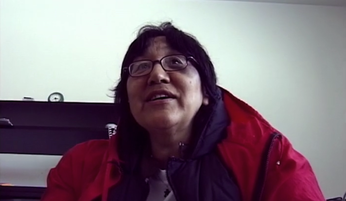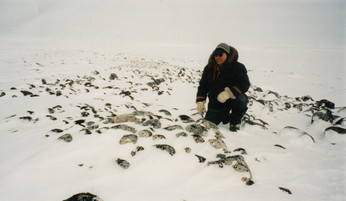Tribute to Emily Novalinga
Tribute to Emily Novalinga
All of us at Avataq Cultural Institute want to pay our heartfelt respects to Emily Novalinga, a true pioneer in Nunavimmiut poetry, who died suddenly in Dorval on October 10, 2009.
Emily began her professional career as a teacher in Puvirnituq, but over the years, she earned recognition as one of the most talented poets, writers and story-tellers in the region. At the time of her untimely passing, Emily was preparing for a tour of Hudson Bay communities to tell her stories with all the energy, humour and verve for which she had become known.
Today, Emily’s poems can be found in a variety of publications and the public sphere. In fact, one of her poems is an integral part of a work by the sculptor Michel Goulet, which is on permanent display in the Place de la Gare du Palais in Quebec City. Makivik Magazine had a story about the two artists in its summer 2008 edition: you can read it here.
Emily also applied her powerful personality to battle courageously against violence towards women – a reality of life which she denounced in her poem “Sparkling Igloo.” This poem, which deals mainly with the subject of about love and life, was featured in 2005 short film directed by Brigitte Lebrasseur, a Puvirnituq nurse and amateur filmmaker.
We are grateful to the production house Vidéo Femmes for allowing us to present this film about Emily Novalinga and her poem “Sparkling Igloo” (Étincelante).
Farewell, Najatsak. Rest in peace.
By Zebedee Nungak, Emily’s cousin
Memories of the early days
Are always vivid, never fade
Igloos and tents
Qayait and dogteams
Carefree times, happy times
Our families living as tuqsuqatigiit-
In conjoined igloos-
Joyful times, Eskimo times
Our fathers are brothers
Our mothers are sisters
Which makes us tapiqquariit -
In doubly reinforced cousinhood
Through your given name
Eemeelie Nujarlutuq
You are my paternal grandmother
Mother of your father
Mother of my father
One I never knew, except through you
Buried among ten others
On the rocky ridge of Nanuqtuuq Hill
In our original land - Saputiligait
Your name caused tuqsurausiit [relationship callings]
In our family to be really alive!
My father called you Anaana [Mother]
You called your father Irniq [Son]
My mother called you Sakiapik [Dear Mother-in-law]
My younger brother Aliva imitated this tuqsurausiq
And called you Sakiapik to the end
My older brother Joanasie was always your Airaarruapik
How can anybody ever forget the silly ditty
You composed and sang to small girls?
“Ilaanit qaigasuaravit Aqiarulaakkunuuliqta”
You had them in the palm of your hand
Leading them to that imaginary place: Aqiarulaakkut
Was this your first poem?
Which escaped our attention?
II
When your brother Matiusie
My cousin and Nunngauqatik
Departed from us early this year
You paid fitting homage to him:
“Matiusie has reached the end of life,
without ever once uttering ‘Eemeelie’”
No explanation was necessary
He always called you Emeemik
In his own poetry with your name
Snippets and clips of life
Keep recurring
In the screen of my mind
Since you left us peacefully, quietly
On that Saturday evening
In your 55th year
Your mother, Alasiapik
My ajakuluk
Making candy out of molasses
In our igloo
Your father Aisakallak
My akkak
Taking me, a young boy,
To spring camp at Inutsutulliq
By dogteam –
Making me feel like a real man!
Then our lives were arrested by “civilization”
As we were destined to go
On a collective journey through “modernization”
Which threw all of us many wicked curves
Some of us were flattened by these hits
And never recovered
Some of us picked ourselves up
And continued to walk forward
Wobbly, tentative, unsteady
No longer the carefree self-confident
Easy-going, perpetually smiling
Devil-may-care Eskimos of the Old Days;
Now burdened with the cares of modern life
III
Here is my homage to you, Najatsak
Life smacked you with many bad hits
But none of these ever defeated you!
That inner strength we discover
In ourselves
Through unplanned adversity
Carried you through
You did not merely survive
The rough parts of life!
You pushed these back
Out of your way!
And kept walking
With confident strides -
Refusing to be robbed
Of your purpose
In a world overflowing with unpleasant shocks
You gave us a shock of real pleasure, indeed!
YOU WERE A POET!
When I heard about your writing
From our mutual friend Hannah
My tiny doubts were blown away
By my vivid recall
Of that little Aqiarulaakkut song
From so long ago
So, you were a poet
YOU WERE A POET!
How proud can we be? How proud can I be?
Then, just as appreciators of poetry notice you
The Lord takes you away
Too soon
The Lord giveth and the Lord taketh away
Blessed be the name of the Lord
You have not bequeathed us any sorrow or sadness
You have handed us inspiration
And a challenge to be positive people of good character…
Farewell, Najatsak. Rest in peace.
Remembering Emily
By Elisapi Tukalak Uitangak, Tiili Aupaluk Alasuak and Alicie Kenuayuak Tukalak, former colleagues of Emily
We remember Emily as a teacher and a hard-working woman who was committed to the future of the people.
She was a professional who received her teaching certificate from the Université du Québec en Abitibi Témiscamingue.
She taught her own traditions, in Inuktitut, to a small group of children who would one day take over.
She taught English to a group of Inuit children who would one day take control of their own lives, in hopes that they would succeed.
Emily even decided to learn a third language -- sign language -- to communicate with those for whom it is the only way to communicate with society.
We remember her involvement in all our meetings, making the sessions lively and joyful. She was eager to learn and participate, and always ready to act on projects. Emily was a permanent incentive.
We remember her for her ability to express her thoughts in her writing from the bottom of her heart and soul.
Emily profoundly believed in herself, and by sharing her vision through poetry, she was calling on all the Inuit to believe in themselves.
She was creative in all that she did and did it all well. She was a caring, sharing and generous person.
Farewell Emily.
An homage to Emily Novalinga
By Gérald McKenzie, former Principal, Puvirnituq School
By sheer accident, Emilie Novalinga was the only Inuk at the Puvirnituq airport when I arrived there with my family in August of 1975. She was carrying a small child in her amautiq. Her smile was all it took to warm our hearts.
She was a young teacher then, but in the 1990s she went on to become a respected writer and poet.
Emily belonged to the first generation of Inuit to receive a formal education, but she remained deeply attached to her Inuit culture and traditions. She was born well before television and computers would change the cultural landscape.
She was part of the first group of teachers to teach Inuit children in their mother tongue of Inuktitut -- not just their language class but all their school subjects. And so she helped bring about some profound changes in the educational system, pushing beyond the assimilating methods of the first northern schools to classes taught in Inuktitut and modern pedagogical methods focussing on the interests of the child within the context of their own culture and language.
Emily was an enthusiastic partner in developing the Puvirnituq School Project and always remained active in training teachers. Her warm and cheerful presence injected life into all our meetings.
As an educator, Emily understood how important it was to create written material in Inuktitut. But she was also one of the few Inuit of her era who appreciated literature of every kind, in every language. All of these factors, combined with her quest for happiness and her willingness to transform her life, fired the poetic flame that illuminated her spirit. She had the courage to face the BLANK PAGE, and thus became one of the leading Inuit poets.
Emily should serve as an important model for aspiring Inuit writers. Poetry ranks first among the literary arts, and so we can look forward to other Nunavik artists following her example, and bestowing upon us their poetry, plays, novels, film scripts, songs, and essays on history, society, spirituality, politics and other fields of knowledge. If we are lucky, the creative flame that stirred Emily will be handed down to others, and continue to enlighten us.
Tribute to Emily Novalinga
By Carole Rowan
In October of 2008, Emily took part in the Nunavik Educator's Bookmaking Workshop as the Writer in Residence. I was so happy when Emily agreed to come to Salluit and take part in the event.
Emily came to support the artistic development of the educators and took part in the Nunavik Educator's Bookmaking Workshop as the Writer in Residence. She was a powerful role model. She provided inspiration and literary expertise. While in Salluit, Emily read from her book, L’Écho du Nord (Novalinga, 2005). She wrote and illustrated a new book called Foggy these Days (Novalinga, 2008), based on the legend of the Kuuttaaq River. She participated in the Educator's workshops; she made a wonderful action poem, read her poetry on the local radio, visited Inuktitut language classes at both the high and elementary schools and was the featured author at a special community event held at the library.
Emily provided a powerful role model. She shared herself as an author and poet, as a thinker, as an Inuk woman and I suggest, presented the possibility for the Educators to see themselves as writers. She did this through her own authorship and enthusiasm for storytelling and story sharing. When Emily presented her stories, the room drew still and we engaged with her, as she enchanted us with words which stimulated visual images and the sound scapes created by her body and voice. Emily opened the door to the Educators seeing themselves as authors because she spoke in Inuktitut and drew on culturally meaningful images and references, from within the Nunavik region.
After the Salluit session was over Emily told me about her dream to travel around Nunavik sharing her stories.


